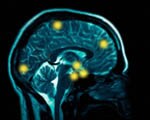Using brain imaging to look at how working memory is influenced by emotions may help identify which children have bipolar disorder and which have attention-deficit / hyperactivity disorder (ADHD).

It is difficult for doctors to differentiate between the two disorders based on behavioural measures alone, but the new finding may help in efforts to develop diagnostic tests based on both neurological and behavioral markers.|
The researchers used functional MRI to observe brain activity in 23 children with bipolar disorder, 14 children with ADHD and 19 children without either disorder (controls) as they did a memory task while viewing faces with different emotions. The children were aged 10 to 18 years and were in the US. Those with bipolar disorder and ADHD were not taking medications.
It was found that compared to the children in the control group, those with bipolar disorder and ADHD showed dysfunction in the prefrontal cortex, which controls behaviour (such as impulsiveness), executive function, working memory, attention and language. Children with ADHD had the most severe dysfunction in the prefrontal cortex, but those with bipolar disorder had more deficits in brain areas involved in emotion processing and regulation.
Modern imaging technology can help to better differentiate between these developmental illnesses, and thereby lead to more accurate diagnoses and targeted treatment for bipolar disorder and ADHD.
DoctorNDTV is the one stop site for all your health needs providing the most credible health information, health news and tips with expert advice on healthy living, diet plans, informative videos etc. You can get the most relevant and accurate info you need about health problems like diabetes, cancer, pregnancy, HIV and AIDS, weight loss and many other lifestyle diseases. We have a panel of over 350 experts who help us develop content by giving their valuable inputs and bringing to us the latest in the world of healthcare.












